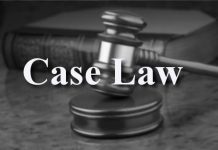This article is written by Gitika Jain, from Amity University, Kolkata. This is an exhaustive article which deals with justice being hampered by public authority’s arbitrariness.
Table of Contents
Introduction
The susceptibility to the vice of arbitrariness is the crux of Article 14 of the Constitution and a very basic factor to the rule of law, the system which governs us. Hence, the State actions should not be dependent on that. The very negation to the rule of law is arbitrariness. The very basic test of the rule of law is based upon which every State action is held as satisfactory and the state cannot even compare itself with private individuals even in the field of contract. The meaning and definition of arbitrariness can easily be visualised other than being stated or defined anywhere.
Rule of law
There was a time when placing wide discretionary powers in the hands of public authorities were thought to be against the rule of law. But this is no longer the case. This does not mean that the rule of law demands the discretionary powers to be eliminated but there should be proper laws framed to control the exercise of such powers. Rule of law requires the powers to have certain legal limits and that the court must lay down those limits in a manner that will strike a balance between executive efficiency and legal protection of citizens. Conferment of powers upon the public authorities by the parliament might seem to be absolute and arbitrary but that arbitrary power and unfettered discretion are something that the court refuses to countenance.
Reasonableness
References from various English cases can be drawn with regard to reasonableness. In Liversidge v. Anderson, the Secretary of the State was empowered to detain a person to protect the interest of the defence, if he has some reasonable cause to make him believe to be of hostile origin by the defence regulations. The House Of lords rejected this power of review on the ground that the Secretary of the State was given absolute discretion in this matter. But the contention of the house of lords was rejected by the lord and king in his speech where he stated that the words once stated have only one meaning and denied the words that “if a man has” can mean “if a man thinks he has”. The decision was however criticised by many academic writers because it proved biases in the court towards subjective interpretations.
In case of Nakkuda v. Jayaratne, the privy council rejected this view and held that whenever the word reasonable is used by the legislature then main purpose must be to serve the same thing as a condition that limits the exercise of arbitrary power because when the matter is left to be decided by the person who has the power then the very intention behind making restrictions will have no effect. Whenever the statute uses phrases like reasonable, reasonable grounds, reasonable cause to believe, then the scope of judicial review was considered by the house of lords.
In the case of Secretary of State For Education v. Tameside Metropolitan Borough Council, the court on finding that the local education authority is acting unreasonably or possibly inappropriately, asked the Secretary of the State to issue directions to such local education authorities. The secretary of state-issued directions to the local authority not to change the schemes that are already implemented in the past because doing that would give rise to two different difficulties and disruption.
Unfettered discretion
There was another case of PadField v. Minister of Agriculture, Fisheries and Food, 1968, where the term ‘statutory policy’ was applied to the minister of the crown. It was therefore held in this case by the house of lords that the act of refusing the milk procedures complaint to the statutory committee was considered to frustrate the policy of the act and the reasons given were also irrelevant and indicative of unlawful motives. This was a case where it is important to notice the actions of the house of lords to scrutinize the minister’s reason so closely. This case is the best example to show that the statutory powers conferred on the authority must be used for the true purpose and for reasons which are irrelevant and proper. The house of lords also rejected the argument of the crown that no reasons need to be mentioned on the side of the ministers and even if some reasons are provided by the ministers they are not to be criticized. In these cases where reasons are not properly given the house can declare that there are no good reasons to support the case.
In the case of RD Shetty v. International Airport Authority of India, it was held that another limitation on the discretion of the government’s power is that they do not have any unrestricted discretion. The government is not as free as an ordinary individual and it cannot choose any person it pleases and acts it’s absolute and unfettered discretion on them. Even if it is a well-established fact in the law the government does not deal with anyone but whenever it does so it should make sure that it exercises its powers without discrimination and any unfair procedure. The law also ensures that the authorities having powers, while dealing with the public, in any field i.e. while providing them jobs or entering into a contract with them or providing them with any kind of lease must not act arbitrarily.
Even in cases where private individuals deal with the public in general, must abide by some standards or norms that are not arbitrary, irrational or irrelevant. During the time of taking actions, the government must not be arbitrary or capricious, instead, the actions must be based on certain principles that pass the test of relevance and reasonableness. This particular rule was mentioned as a rule of administrative law and originated from the doctrine of equality embodied in Article 14.
Various above-mentioned judgements reaffirmed the principle of non-arbitrariness and reasonableness in the actions of the government. This affirmation is also laid down in our entire constitutional scheme and structure.
Arbitrariness
An arbitrary decision is one that is based on whim or purely subjective dislikes and likes. An arbitrary decision always lacks objectivity and predictability. There is no law made that gives directly the power to act arbitrarily. The result of arbitrariness can also be discrimination. Whenever any decision is taken without applying mind for taking into consideration some relevant facts it results in arbitrariness. But when a decision lacks malafide intention given an arbitrary decision can be accepted provided that such decision is a result of an honest person with the best of his intention.
In the case of Ajay Hasia v Khalid Mujib, it was observed by the Supreme Court that even though oral interview test has a lot of drawbacks and deficiencies particularly at the time when the moral values and corruption and nepotism of the country was increasing, allocating a higher percentage of marks to the oral interview done to the written test was considered to be an act of arbitrariness. Allocating 33.3% of the total marks for oral interview test was unreasonable and arbitrary and the Supreme Court stating the liver position held that whenever there is an arbitrariness in state action in the executive and legislative level under Article 12, Article 14 immediately comes into play and strikes down such actions of the state.
the Constitution only stresses on the concept of reasonableness and non-arbitrariness which is the golden thread to run the whole Constitution without any hindrances. Thus, in the case of R D Shetty v. International Airport authority, where there were tenders invited and the conditions mentioned in the notice as regards accepting tenders, the tendrils that were not able to fulfil the conditions mentioned in the notice was considered to be an arbitrary act. Also inviting the tenders and rejecting the lowest quotation without rendering any reason was also considered to be arbitrary in the case of M/s Chirag Enterprise v. The State of Rajasthan.
The petitioner after receiving a recommendation for a visa application by the Commissioner for grant of privilege to supply our was not approved by the government and was rejected on the ground that the application included another money lending business and was held to be arbitrary in State of Madras v Vediappan.
Concept
The most comprehensive and dynamic with zigzag development from time to time is our Constitution of India. As and when our society changes, a set of fresh interpretations are added to the Preamble of our Constitution. It keeps pace with the changing political and social-economic scenarios vesting wide powers with legislators, judges and administrators and thereby keeping them within the constitutional parameters. Though there are parameters set in the preamble of the Constitution, still there are certain groups that act arbitrarily. Thus it becomes important to establish liberal democracy or rule of law society where the powers are dispersed in various government institutions of governance and the one affected by such power can hold the rulers accountable.
The main problem arises when the people holding power believe themselves to be the rulers and believe the fact that they can exercise their powers as and when they choose to do so. In a rule of the law society, there are various organs of government that have certain accountability, for example, the legislators are accountable to people, the judges are accountable to the parties of the case, etc. Thus, in a rule of the law society, the scope of accountability is greater because there exists an excess of power.
Thus in a democratic country like India where there is guaranteed freedom of speech and expression and a statutory right to know, it is difficult in the long run to prevent and increase in public awareness about the exercise of government powers on them. It becomes important to form a mechanism of accountability to maintain transparency in the government system. This is a sure-shot technique to minimise administrative faults. The Right to Information Act, 2005 can be one such mechanism to disclose the transparency of the government working. Through this legislative mechanism, people have the right to ask for information for relevant facts and the concept of open this will be maintained. However, there are some restrictions on the disclosure of matters related to the security of the state or the matters which involve National interest or public interest. These are the restrictions that the ministers take undue advantage of and hide their correct intention and play with the moral sentiments of the people.
Constitutional aspects
Article 14 and 16 of the Constitution strikes arbitrariness in state action and ensures that there remain fairness and equality of treatment amongst all. These articles require that the action of the state must be based on a relevant doctrine that is applicable to everyone and does not discriminate against anyone. This was held in the case of EP Royappa v. State of Tamil Nadu and others. Rationality and fairness must be the outcome of striking arbitrariness from democracy. Or a condition that is related to the termination of service of permanent or temporary employees can be said to be arbitrary and against the rule of law because it denies equal protection and offends the equality clauses in Article 14 and 16 (1). This was held in the case of The Manager, Government Branch Press v. DB Belliappa. Arbitrariness can be at any level of state action be it legislature or executive or an authority under Article 12. This is where Article 14 comes into play and it strikes down such state action that contains unreasonableness and arbitrariness. In case of SK Ghosh and another v. Union of India where there was a matter of inter-seniority of Indian postal service officers, it was held by the court that an arbitrary order which affects the civil rights in respect of future promotion should be struck down because it violates Article 16 of the Constitution.
In another case of Nepal Singh v. State of UP and others, it was held that the state must make sure that the requirements of Article 14 and 16 of the Constitution are met while dealing with the government servants. If there is an arbitrary exercise of power by the state, it would violate the guarantee provided in the Constitution that is the guarantee of equality and protection against discrimination. Therefore such arbitrary actions required to be quashed and cannot sustain any further, which was held in Ajit Singh and others v. State of Punjab and others.
Conclusion
Therefore it is necessary that these mechanisms are laid down in a proper manner and limited restrictions are there. The judiciary, therefore, has a vital role to play with regard to Maladministration so that the very goal of the preamble i.e. to provide justice to all the citizens does not remain unfulfilled.
References
LawSikho has created a telegram group for exchanging legal knowledge, referrals and various opportunities. You can click on this link and join:
 Serato DJ Crack 2025Serato DJ PRO Crack
Serato DJ Crack 2025Serato DJ PRO Crack











 Allow notifications
Allow notifications


